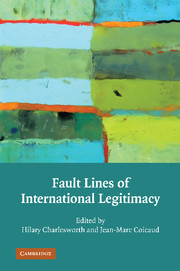Book contents
- Frontmatter
- Contents
- Acknowledgments
- Contributors
- Introduction
- PART I FROM THE HISTORY AND STRUCTURE OF INTERNATIONAL LEGITIMACY TO FAULT LINES IN CONTEMPORARY INTERNATIONAL POLITICS
- 1 Legitimacy, Across Borders and Over Time
- 2 Deconstructing International Legitimacy
- 3 The Evolution of International Order and Fault Lines of International Legitimacy
- 4 Intervention in a “Divided World”: Axes of Legitimacy
- 5 From Berlin to Bonn to Baghdad: A Space for Infinite Justice
- PART II THE UN SECURITY COUNCIL: EXPRESSION, VENUE, AND PROMOTER OF INTERNATIONAL LEGITIMACY?
- PART III LEGITIMACY OF INTERNATIONAL INTERVENTIONS AND HIERARCHY OF INTERNATIONAL RIGHTS
- PART IV IN SEARCH OF NEW FORMS OF INTERNATIONAL LEGITIMACY: BETWEEN POWER AND PRINCIPLES
- Conclusion: The Legitimacies of International Law
- Index
- References
5 - From Berlin to Bonn to Baghdad: A Space for Infinite Justice
Published online by Cambridge University Press: 06 April 2010
- Frontmatter
- Contents
- Acknowledgments
- Contributors
- Introduction
- PART I FROM THE HISTORY AND STRUCTURE OF INTERNATIONAL LEGITIMACY TO FAULT LINES IN CONTEMPORARY INTERNATIONAL POLITICS
- 1 Legitimacy, Across Borders and Over Time
- 2 Deconstructing International Legitimacy
- 3 The Evolution of International Order and Fault Lines of International Legitimacy
- 4 Intervention in a “Divided World”: Axes of Legitimacy
- 5 From Berlin to Bonn to Baghdad: A Space for Infinite Justice
- PART II THE UN SECURITY COUNCIL: EXPRESSION, VENUE, AND PROMOTER OF INTERNATIONAL LEGITIMACY?
- PART III LEGITIMACY OF INTERNATIONAL INTERVENTIONS AND HIERARCHY OF INTERNATIONAL RIGHTS
- PART IV IN SEARCH OF NEW FORMS OF INTERNATIONAL LEGITIMACY: BETWEEN POWER AND PRINCIPLES
- Conclusion: The Legitimacies of International Law
- Index
- References
Summary
In 1884, after their respective military expeditions had laid claim to different parts of Africa, colonial powers convened in Berlin to pore over maps, argue boundary lines, and divvy up the continent among themselves. The Berlin conference explicitly concerned the contours of European sovereignty over different parcels of Africa. No Africans were present at the gathering. More than 100 years later, in 2001, Bonn was the venue for another conference convened by the great “Western” powers; this time, the maps were of Afghanistan. Yet, in the twenty-first century, with the ghost of Berlin hovering over the current discourse of intervention, the Bonn conference ostensibly addressed the contours of Afghan sovereignty. The UN searched across the world, from the hills of Rome to the beaches of Cyprus, to find Afghans to attend. Fewer than two years later, in the 2003 “liberation” of Iraq, Baghdad became yet another venue for “recognizing” sovereignty – in an effort that George W. Bush claimed (and apparently with little intentional irony) is focused on Iraqis choosing their own regime.
Even as the specific rationale for the U.S. intervention in Iraq confronted an ever-growing legitimacy crisis, the normative terrain of legitimacy that was invoked by the Bush administration (whose touchstones of protection and internationalist solidarity are discussed herein) has gained further traction in the realm of humanitarian law and policy.
- Type
- Chapter
- Information
- Fault Lines of International Legitimacy , pp. 146 - 172Publisher: Cambridge University PressPrint publication year: 2010



